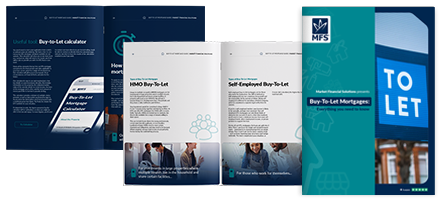Disclaimer
Market Financial Solutions are a bridging loan and buy-to-let mortgage provider, not financial advisors. Therefore, Investors are encouraged to seek professional advice. The information in this content is correct at time of writing.

Landlords faced a difficult year in 2024. In fact, since at least the 2022 mini budget, landlords and property investors have had to contend with rising costs, tightened lending criteria, and nervous high street banks.
Not to mention the bleak sentiment that’s surrounding BTL investors themselves. The wider market is struggling with a lack of suitable supply for both buyers and renters. Unfortunately, some of the blame for this has been levied – often unfairly – on landlords.
Commentary on this often paints landlords as greedy land barons, raising rents to unreasonable levels and taking much-needed stock off the market. In fact, landlords were not even deemed working people by the end of 2024[1].
With this rhetoric, it’s unsurprising that many of the challenges landlords faced last year will continue to affect buy-to-let in 2025. But that doesn’t mean that this year has nothing to offer landlords.
We will look over the pros and cons of buy-to-let in the current, and coming market. There are both opportunities and risks ahead for brokers and borrowers, and everyone needs to be prepared.
The pros of buy-to-let
Let’s start with the positives as we explore the pros and cons of buy-to-let. For starters, rates could be on their way down across the market.
Andrew Bailey, the Bank of England governor, expects four base rate cuts this year, so long as inflation eases[2]. Which?[3] forecasts the base rate could fall to 4% by the end of the year, which could in turn push down costs in the lending industry. At the very least, this could restore a sense of confidence in the market.
In fact, many experts expect more competitive rates and terms from lenders in 2025, to the benefit of borrowers[4]. The incentive may be there to utilise these potential deals too.
While slowing somewhat, rents are set to rise in 2025[5]. Costs may eat into this, but towards the end of last year, yields proved surprisingly high across England[6]. Given how there is still plenty of demand for rental properties in the UK, rental yields are expected to remain stable in 2025[7].
Indeed, the imbalance between supply and demand will continue to sway buy-to-let in 2025, according to Zoopla[8]. Also, outside of the residential market, there is plenty of potential in the commercial scene. The CBRE[9] expects offices, industrial and logistics properties, data centres, retail assets, and more to bounce back in 2025.
Just as is the case with any year, there will be pros and cons of buy-to-let investment in 2025. Hopefully, we’ll be able to take advantage of the pros, but we mustn’t lose sight of the cons in the process.

The cons of buy-to-let
Without dwelling, there are several hurdles ahead of BTL investors. Cost challenges remain, as do legislative, and sentiment problems. A few key (potential) issues include the Renters’ Rights Bill, Awaab’s Law, EPC targets, student housing pressures, and more[10].
Inevitably, this will force some landlords to abandon buy-to-let in 2025 entirely. In a recent forecast, UK Finance predicted a 7% drop in mortgage lending for buy-to-let purchases in 2025[11], when compared with last year. Also, the latest English Private Landlord Survey showed a third of landlords may be looking to sell off some or all of their rental properties[12].
Even here though, it’s important to embrace an optimistic outlook. Should some landlords sell up over the coming months, opportunities could be created for those looking to buy. There’s evidence too that many investors are willing to tough it out this year.
The opportunities in 2025
Immediately following the last budget, which delivered £40bn worth of tax hikes[13], Benham and Reeves surveyed landlords spread across England. Even with everything going against them, the results showed 84% planned to remain in the BTL sector this year. Some 4% even planned to increase their portfolio size[14].
There are still plenty of options outside of the standard, residential BTL market too. For those who simply can’t justify the residential risks in 2025, they can instead think outside the box with the commercial market.
There has been a notable rise in commercial-to-residential conversions in recent years[15], which could present a cheaper/alternative entry point for property investors. The opposite could also prove beneficial for the right landlord, as they turn their struggling residential space into a thriving restaurant, office, gym, or dentist.
Refreshing what’s already owned, rather than investing in something new, may also pay dividends. There is mandatory demand for greener properties in the current market[16]. A few upgrades may be all it takes to push an EPC rating higher, and tenants want to live in greener homes. Some may be willing to pay more for the privilege[17].
What’s important to remember is that we don’t know what we don’t know. There are pros and cons of buy-to-let in 2025, but we can only truly prepare for what we know is on the way. As should be obvious by now, the property market can be beset by unexpected announcements, legislative shifts, and unforeseen troubles in the blink of an eye.
There will be a way forward for all of these, but they’ll require support from lenders who can adapt to a dynamic economy, and political climate. At Market Financial Solutions, we never stopped lending throughout all the ups and downs of 2024. With renewed funding lines behind us, alongside an expanded workforce, we’ll continue to do so in 2025.
The Complete Guide to
Buy-to-Let Mortgages
Everything you need to know
- Fundamentals
- Different mortgage types
- Useful tools
- Industry stats & more
[1] https://www.landlordzone.co.uk/news/landlords-are-working-people-says-housing-minister
[2] https://www.ft.com/content/800198bf-afc6-4bf3-9053-81c0e07cc50a
[3] https://www.landlordtoday.co.uk/breaking-news/2024/12/good-news-on-mortgage-rates-expected-in-2025/#:~:text=%E2%80%9CThe%20base%20rate%2C%20currently%204.75,%25%E2%80%9D%20says%20the%20consumer%20body
[4] https://inews.co.uk/inews-lifestyle/money/property-and-mortgages/what-happen-mortgage-rates-2025-experts-3440647
[5] https://www.savills.co.uk/insight-and-opinion/savills-news/354578-0/uk-rents-to-keep-on-rising-but-will-hit–affordability-ceiling–in-2025
[6] https://www.property118.com/rental-yields-rise-across-england-london-leads-the-way/
[7] https://www.estateagenttoday.co.uk/features/2024/12/2025-predictions-for-the-private-rental-sector/
[8] https://www.zoopla.co.uk/discover/property-news/rental-market-report/
[9] https://www.cbre.co.uk/insights/reports/uk-real-estate-market-outlook-2025
[10] https://www.telegraph.co.uk/money/property/buy-to-let/what-happen-buy-to-let-2025/
[11] https://www.bbc.co.uk/news/articles/c7ver9z38vjo
[12] https://www.telegraph.co.uk/money/property/buy-to-let/devastating-landlord-exodus-hit-britain/
[13] https://fortune.com/europe/2024/10/30/rachel-reeves-uk-budget-40-billion/
[14] https://www.propertyreporter.co.uk/majority-of-landlords-say-theyll-remain-in-the-sector-following-the-budget.html?SRC=MC&dm_i=7MRI,70KS,QJ95B,ULBJ,1
[15] https://www.thisismoney.co.uk/money/smallbusiness/article-14105613/Surge-shops-offices-converted-homes-landlords-tap-sky-high-property-demand.html
[16] https://www.landlordtoday.co.uk/breaking-news/2024/12/landlords-embracing-green-practices-but-still-more-to-be-done/
[17] https://www.property118.com/tenants-want-greener-homes-but-not-higher-rents/





